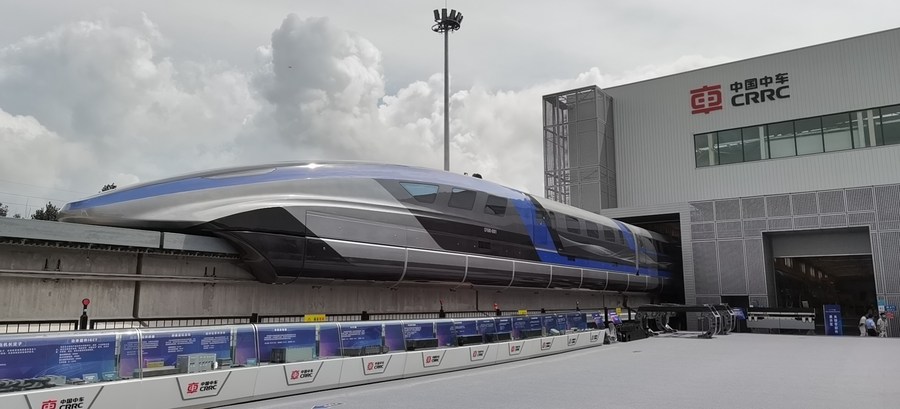Sci-tech progress an engine for China's high-quality development

Photo taken with a mobile phone on July 20, 2021 shows China's new maglev transportation system in Qingdao, east China's Shandong Province. [Xinhua/Wang Kai]
BEIJING -- In a new journey to build itself into a modern socialist country, China sets new goals for high-quality development at its ongoing two sessions. The country must speed up science and technology progress as a boosting engine to achieve the goals.
This year's government work report said China needs to promote scientific and technological innovation to upgrade its industries, eliminate the bottlenecks in supply, and realize high-quality development through innovation.
High-quality development is crucial to China's economic and social development during the 14th Five-Year Plan period and beyond.
Sci-tech progress has contributed effectively to this development. China's 169 state-level high-tech zones contributed about 13 percent of the GDP in 2021, with only 0.1 percent of its land area.
Committed to a people-centered development philosophy, China has also brought more comfort and convenience to its people with sci-tech progress, ranging from a clean environment and artificial intelligence to the BeiDou Navigation Satellite System.
Achievements in the biology and pharmaceutical industry were particularly significant. It helped the country protect its people against the COVID-19 epidemic, providing quick and cheap nucleic acid tests, massive vaccination, and medicines under development and tests.
The sci-tech progress is key to the country's modernization. It focuses on the large population, common prosperity for all people, a balance between material and social progress, harmonious coexistence between humankind and nature, and peaceful development.
The massive sci-tech application has helped China advance in those aspects. High-speed railways and 5G networks that bring more opportunities to rural areas, renewable energy that powers the economy with less pollution, or anti-disease crops that use fewer pesticides, to name a few.
With these advances, however, China's science and technology still face bottlenecks in key and core areas, which has affected the security of industrial and supply chains and the country's high-quality development.
It's necessary for China to increase the investment in science and technology to break the bottlenecks. China's spending on research and development in 2021 rose 14.2 percent year on year to reach 2.79 trillion yuan (about 441.66 billion U.S. dollars), a new high of 2.44 percent of its GDP.
China also strives to improve the environment for innovation across industry, academia, research, and application, as a friendly environment shall help the investment generate more cutting-edge output.
This year's government work report pledged to further reform the sci-tech governance system, improve intellectual property protection, and raise incentives for innovative enterprises. These include additional tax deductions for R&D costs and tax breaks to enterprises that invest in basic research.
China's sci-tech progress will also make itself better prepared for international sci-tech cooperation and contribute more to the global sci-tech development for the benefit of humanity at the same time.
This year China will continue to engage in international sci-tech cooperation to build talent centers and innovation hubs of global importance.
Sticking to its blueprints, China will see its sci-tech progress facilitate both its modernization drive and the world's development.
The views don't necessarily reflect those of Qiushi Journal.
























